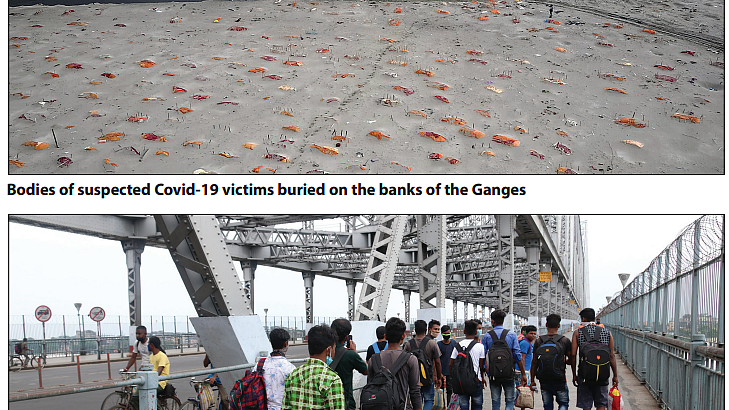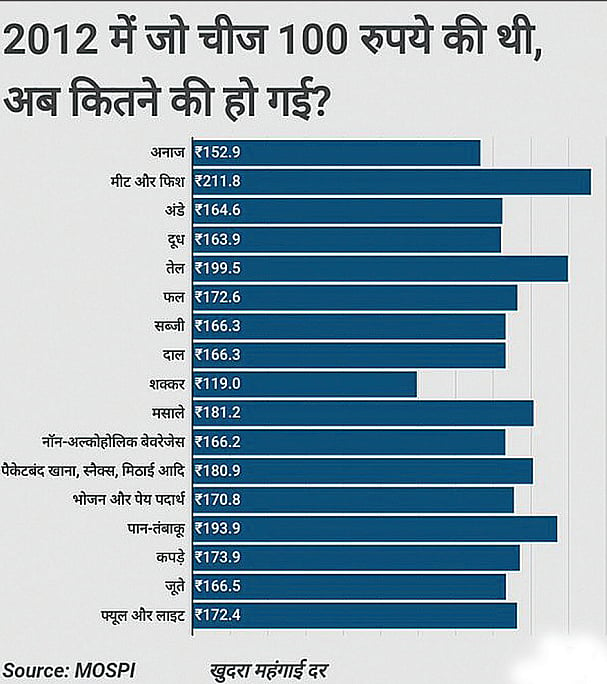PM Modi completes three years of his second term today: Have they been good, bad, average or ugly?
The economy and questionable policy decisions have marked the last three years while the government builds the Ram temple and the central vista

Narendra Modi was sworn in for the second successive term as Prime Minister on May 30, 2019 following a landslide victory in the general election. As the government completes three years of its second term on Monday, May 30, it’s time to evaluate its performance sans the hype likely to be whipped up. While the official narrative remains that India has taken unprecedented strides towards a 5 trillion dollar economy (the deadline pushed back to 2030 now), the record does not present a pretty picture.
The World Bank’s World Governance Indicators, a key input for India’s sovereign ratings, placed India’s scores much below its peers. The indicators ranked 215 countries on six dimensions of governance: Voice and Accountability, Political Stability and Absence of Violence, Government Effectiveness, Regulatory Quality, Rule of Law and Control of Corruption. It was found that all 15 data sources whose ratings impacted India’s overall WGI scores, including the Economist Intelligence Unit, Varieties of Democracy Project, Freedom House and Heritage Foundation Index of Economic Freedom etc., had downgraded India under PM Modi.
The economy remains in a bad shape and unprecedented concentration of wealth and rise of monopolies have widened the gulf between the rich and the poor. While Inflation has broken the back of the common man, corporate profits have soared despite the pandemic and declining demand. A recent report suggests that profit of fuel companies have shot up by 43% in 2021-22 while FMCG companies’ profit has grown by as much as 68%. Edible oil manufacturing companies have seen their profit grow by 90% while profits of milk cooperatives have gone up by 118%. The Government failed to regulate profits of big pharma and private hospitals even as prices of medicine and vaccines soared.
Even otherwise the government’s record of governance has been poor. The last three years have seen the government repeatedly on the back foot. It refused to confirm or deny the allegation that it purchased the expensive, military grade Israeli spyware Pegasus and used it against the civil society. A technical committee appointed by the Supreme Court has found prima facie evidence of smart phones hacked by Pegasus, though its report is awaited. Similarly, the government found itself on the back foot on farm laws and its blatant misuse of sedition laws.
The government was caught napping by the pandemic, busy as it was in renaming the Sardar Patel stadium in Ahmedabad as Narendra Modi stadium and laying the red carpet for the outgoing US President Donald Trump. It woke up too late and clamped a harsh nation-wide lockdown at four hours’ notice in March, 2020 (similar four hours’ notice was given for the disastrous demonetisation in 2016). Although India is the world’s largest vaccine manufacturer, the government’s vaccine policies and flip flops allowed private manufacturers to make abnormal profits at public cost.
Before the second wave of the pandemic, the PM boasted that India had triumphed over the virus and was ready to save the world. The government continued to deny data of deaths, lack of oxygen, ventilators, technicians and hospital beds even as evidence piled up of dead bodies floating in rivers. The WHO has now estimated that Covid deaths in India at 4.7 million were almost ten times more than the official death count of 5.24 lakhs as on May 24, 2022.
So, what will the last three years be remembered for? We list some of the milestones since 2019 by way of a reminder.
Amit Shah as Home Minister: One of the most far-reaching decisions in PM Modi’s second term was appointing Amit Shah as the Union Home Minister in June 2019. Rajnath Singh was the MHA from 2014 till 2019. Shah’s tenure as HM has seen riots in Delhi, spread of communal polarisation, Citizenship Amendment Act (rules are yet to be framed) and threat of extending NRC to the rest of the country, Chinese incursions in Ladakh and Arunachal Pradesh, poaching of opposition MLAs and extensive use of central agencies against opposition leaders and dissenters. Jury is still out on whether he is the best or the worst home minister of India.
Suspending Article 370: Three years after Article 370 was suspended or revoked (petitions challenging it remain pending before the Supreme Court), the situation in Kashmir remains volatile. More Pandits have been targeted by militants post-2019 than between 2010 and 2019. Elections are yet to be held. There is no Assembly. Bifurcation of the state into Union Territories did not stamp out resentment and alienation. Militant activities have increased while Kashmiri leaders are detained while several journalists and human rights activists are in jail booked under the stringent Public Security Act. It has arguably weakened India’s case on Kashmir in international fora and the media.
Ayushman Bharat Scheme: Touted as the world’s biggest cashless medicare scheme, it surprisingly has few takers, according to the government’s own admission. In March this year, the government told Parliament that no beneficiary of the scheme was denied treatment due to lack of funds but the scheme’s budget was slashed due to lower requirements from states. The budget estimates for the scheme for 2019-20, 2020-21, and 2021-22 were Rs 6,400 crore each year against which the revised estimates were Rs 3,200 crore, Rs 3,100 crore, and Rs 3,199 crore respectively.
Criminalising Triple Talaq: The PM claimed he had liberated Muslim women by criminalising instant divorce among Muslims even as men professing other faith continue to abuse, rape and disown wives without facing criminal prosecution. No empirical data were submitted or cited to justify the amendment. NFHS data now suggests that 17 Hindu women out of 1,000 reported that their husbands married more than one woman as against 25 Muslim women out of 1000.
Stifling the Parliament: Photograph of Prime Minister Modi prostrating at the steps leading to the Parliament in 2014 (one which should perhaps be exhibited in every government office) has not deterred his government to deviate from conventions. Nobody has been elected the Deputy Speaker in the Lok Sabha (a post that normally goes to the opposition); budgets have been passed without debates; more ordinances have been promulgated than before and fewer Bills have been sent to committees for scrutiny. Opposition demands for debate on crucial public issues denied.
Defying Supreme Court collegium: The Government has continued cherry picking from the recommendations made by the Supreme Court collegium for appointment of chief justices and appointment and elevation of judges to the high courts and the SC. Despite proddings by the collegium, several hundred posts of high court judges and chairpersons of tribunals remain vacant.
The farm laws fiasco: The ill-advised decision, taken without adequate consultations and without a proper debate in parliament, to promulgate three farm marketing laws through ordinances in the middle of the pandemic, and later pushed through Parliament, had to be withdrawn by the PM. But not before an unprecedented one-year long agitation by farmers. The government’s promise to appoint a committee to explore making Minimum Support Price (MSP) a legal right and doubling of farmers’ income by 2022 yet to be fulfilled.
Defence debacle: The Prime Minister’s ill-advised claim on camera that nobody had intruded into Indian territory buttressed China’s claim that it was India who had intruded into Chinese territory. While the MEA has now grudgingly accepted that China is making a second bridge in the occupied territory in Ladakh, and while the incursion in Galwan has pushed India into the arms of an anti-China axis led by the US, the government appears to be preparing the ground to concede Indian territory to China.
Chief of the Defence Staff: The post was created in 2019 amidst much hype. But after the untimely death of the first CDS general Bipin Rawat in a tragic helicopter crash, no appointment has been made for the past six months and the government is said to be having second thoughts about the concept itself.
Economy in doldrums
• As the Modi Government completes three years of its second term in office, the Wholesale Price Index inflation is at a 17-year high while the Consumer Price Index inflation is at a 8-year high.
• A total of 8,81,254 Indians have given up their citizenship since 2015 and 35,000 Indian entrepreneurs (High Net Worth Individuals) left India between 2014-2020.
• The Chairman of PM’s Economic Advisory Council, Bibek Debroy, admitted that poverty estimates cannot be measured in the absence of consumption expenditure surveys. The last survey done in 2017 was supressed by the government. No prizes for guessing why.
• India’s labour force shrank by 3.8 million in March 2022. Unemployment rose across sectors: 76 lakh jobs were lost in industry, 41 lakh in manufacturing and 29 lakh in construction.
• Between 2014 and 2021, a total of 2,783 foreign companies shut shop in India. They include General Motors, Harley Davidson, Royal Bank of Scotland, Citibank, Ford, Lafarge, Barclays, Cairn, Henkel, Metro and Holcim.
• India received $80 billion in foreign investment in 2020-21, but it plummeted to $22 billion in 2021-22.
• Portfolio investmentswere $38 billion in 2020-21 but $15 billion was lost in 2021-22. NRI deposits declined by about $3 billion in FY 2021-22.
• In December 2021, India had international assets of $926 billion (investments of $293 billion and forex reserves of $633 billion). However, external liabilities were $1,284 billion.
(This was first published in National Herald on Sunday)

Follow us on: Facebook, Twitter, Google News, Instagram
Join our official telegram channel (@nationalherald) and stay updated with the latest headlines